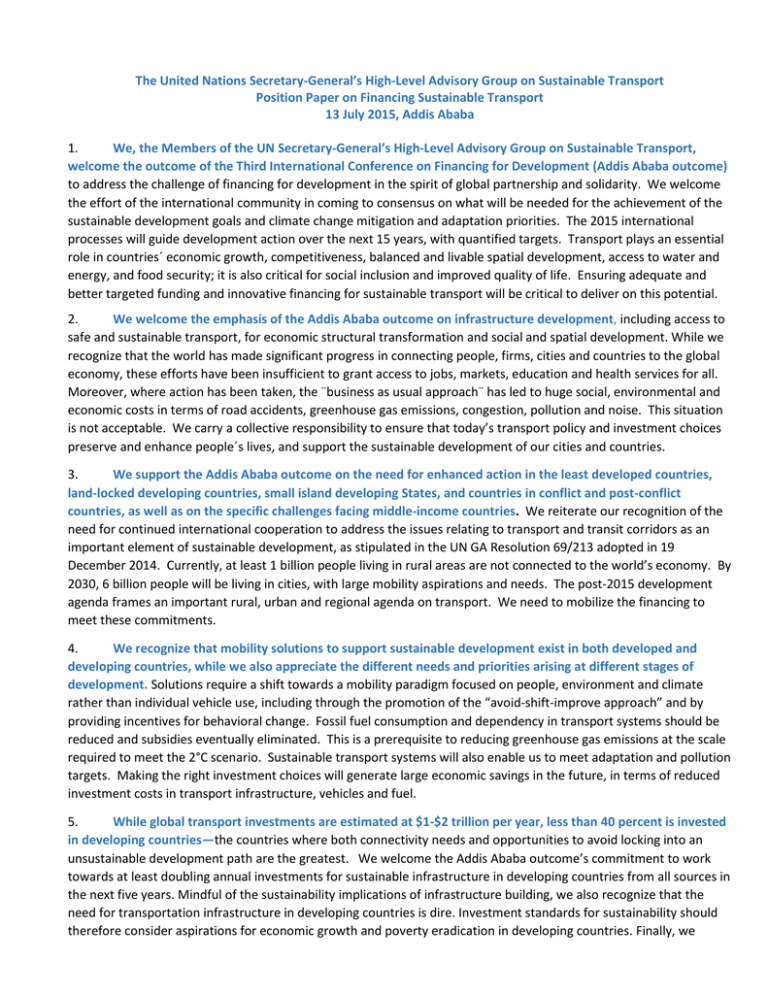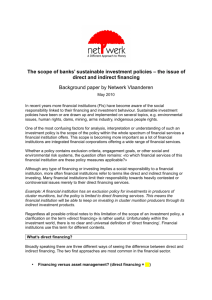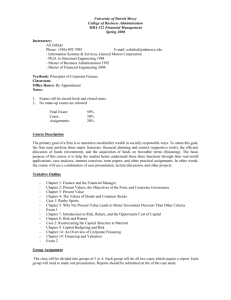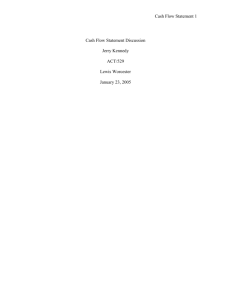The United Nations Secretary-General’s High-Level Advisory Group on Sustainable Transport
advertisement

The United Nations Secretary-General’s High-Level Advisory Group on Sustainable Transport Position Paper on Financing Sustainable Transport 13 July 2015, Addis Ababa 1. We, the Members of the UN Secretary-General’s High-Level Advisory Group on Sustainable Transport, welcome the outcome of the Third International Conference on Financing for Development (Addis Ababa outcome) to address the challenge of financing for development in the spirit of global partnership and solidarity. We welcome the effort of the international community in coming to consensus on what will be needed for the achievement of the sustainable development goals and climate change mitigation and adaptation priorities. The 2015 international processes will guide development action over the next 15 years, with quantified targets. Transport plays an essential role in countries´ economic growth, competitiveness, balanced and livable spatial development, access to water and energy, and food security; it is also critical for social inclusion and improved quality of life. Ensuring adequate and better targeted funding and innovative financing for sustainable transport will be critical to deliver on this potential. 2. We welcome the emphasis of the Addis Ababa outcome on infrastructure development, including access to safe and sustainable transport, for economic structural transformation and social and spatial development. While we recognize that the world has made significant progress in connecting people, firms, cities and countries to the global economy, these efforts have been insufficient to grant access to jobs, markets, education and health services for all. Moreover, where action has been taken, the ¨business as usual approach¨ has led to huge social, environmental and economic costs in terms of road accidents, greenhouse gas emissions, congestion, pollution and noise. This situation is not acceptable. We carry a collective responsibility to ensure that today’s transport policy and investment choices preserve and enhance people´s lives, and support the sustainable development of our cities and countries. 3. We support the Addis Ababa outcome on the need for enhanced action in the least developed countries, land-locked developing countries, small island developing States, and countries in conflict and post-conflict countries, as well as on the specific challenges facing middle-income countries. We reiterate our recognition of the need for continued international cooperation to address the issues relating to transport and transit corridors as an important element of sustainable development, as stipulated in the UN GA Resolution 69/213 adopted in 19 December 2014. Currently, at least 1 billion people living in rural areas are not connected to the world’s economy. By 2030, 6 billion people will be living in cities, with large mobility aspirations and needs. The post-2015 development agenda frames an important rural, urban and regional agenda on transport. We need to mobilize the financing to meet these commitments. 4. We recognize that mobility solutions to support sustainable development exist in both developed and developing countries, while we also appreciate the different needs and priorities arising at different stages of development. Solutions require a shift towards a mobility paradigm focused on people, environment and climate rather than individual vehicle use, including through the promotion of the “avoid-shift-improve approach” and by providing incentives for behavioral change. Fossil fuel consumption and dependency in transport systems should be reduced and subsidies eventually eliminated. This is a prerequisite to reducing greenhouse gas emissions at the scale required to meet the 2°C scenario. Sustainable transport systems will also enable us to meet adaptation and pollution targets. Making the right investment choices will generate large economic savings in the future, in terms of reduced investment costs in transport infrastructure, vehicles and fuel. 5. While global transport investments are estimated at $1-$2 trillion per year, less than 40 percent is invested in developing countries—the countries where both connectivity needs and opportunities to avoid locking into an unsustainable development path are the greatest. We welcome the Addis Ababa outcome’s commitment to work towards at least doubling annual investments for sustainable infrastructure in developing countries from all sources in the next five years. Mindful of the sustainability implications of infrastructure building, we also recognize that the need for transportation infrastructure in developing countries is dire. Investment standards for sustainability should therefore consider aspirations for economic growth and poverty eradication in developing countries. Finally, we support the establishment of a global infrastructure forum. Building on existing multilateral collaboration mechanisms, this forum will help improve coordination among established and new infrastructure initiatives, multilateral and national development banks, UN agencies, national institutions, development partners and the private sector. 6. Investments in sustainable transport will need to be fostered by the public sector. Domestic public sector funding accounts for the bulk of transport investments in developing countries but is insufficient to provide the sustainable infrastructure, service and maintenance needed. Current sources of funding include general taxes, specific transport charges and user fees. Enhanced sources of funding are needed to finance initial investments, including a growing reliance on the “user pays” principle, fuel taxes and innovative approaches (e.g. land value capture) and those which reduce demand for conventional transport. Investments in improving the energy efficiency of urban transportation could ultimately lead to a savings of up to $70 trillion. The capacity of cities to generate and direct financial resources for sustainable transport must be enhanced, with a key role for national policies to provide enabling frameworks and technical assistance. Public sector action can also be critical in promoting sustainable public transport, leading by example and creating incentives for private investment. 7. Private financing will require transparent enabling frameworks, incentives and adequate risk-sharing mechanisms to tap into available global liquidity. We acknowledge that there is substantial capital and liquidity; and yet, the world is facing a growing mismatch between financing needs—particularly for longterm infrastructure—and available financing, a gap particularly acute in lower-income countries. Public-private partnerships (PPPs) are constrained for transport. Land markets, incentives and risks between public, private and other entities are not well aligned to adequately foster sustainable transport. Institutional investors lack well defined and harmonized criteria to assess sustainability of projects. To attract private financing, countries and cities require bankable projects that fit the needs of their citizens. 8. We welcome the ongoing efforts of the world’s eight largest Multilateral Development Banks to fund more safe and sustainable transport, and meet their $175 billion pledge over the 2012-22 period. This pledge stands as a basis for leveraging additional investment from national governments and the private sector. We encourage the new MDBs, such as the New Development Bank and the Asian Infrastructure Investment Bank, as well as bilateral donors, to join these efforts and expand the supply of finance for sustainable transport infrastructure and services. We encourage all development financiers to devise innovative financial solutions, notably those focusing on regional efforts and PPPs. 9. We welcome pledges made to the Green Climate Fund (GCF), and the GCF’s efforts to begin financing projects as soon as possible. So far, transport financing from climate funds has been extremely limited—less than 13 percent of all major climate and environmental funds. The funding process must be adapted to better accommodate the complexity and character of transport projects. We support efforts to implement the commitment of developed country parties to the UNFCCC, with a goal of jointly mobilizing $100 billion annually by 2020. The GCF has already identified low-emission transport as one of four strategic impact areas. We support the quick launch of the GCF to reduce the total cost of transition to the 2°C scenario pathway. 10. Other dedicated financing mechanisms will be needed to ensure rapid action at scale on road safety. More than 1.5 million people lose their lives every year due to traffic accidents and transport-induced air pollution, of which 92 percent are in developing countries. Road safety has emerged as a global public cause. We recognize the role of international road safety financing mechanisms, including the Global Road Safety Facility, and encourage bold action and financing to meet the commitments under the UN Decade of Action on Road Safety. 11. We, the Members of the UN Secretary-General’s High-Level Advisory Group on Sustainable Transport, are committed to providing actionable policy recommendations at the local, regional, national and global levels, and to promoting safe and sustainable mobility to enhance inclusive economic growth, spatial and social development, climate change priorities and the protection of the global environment.







